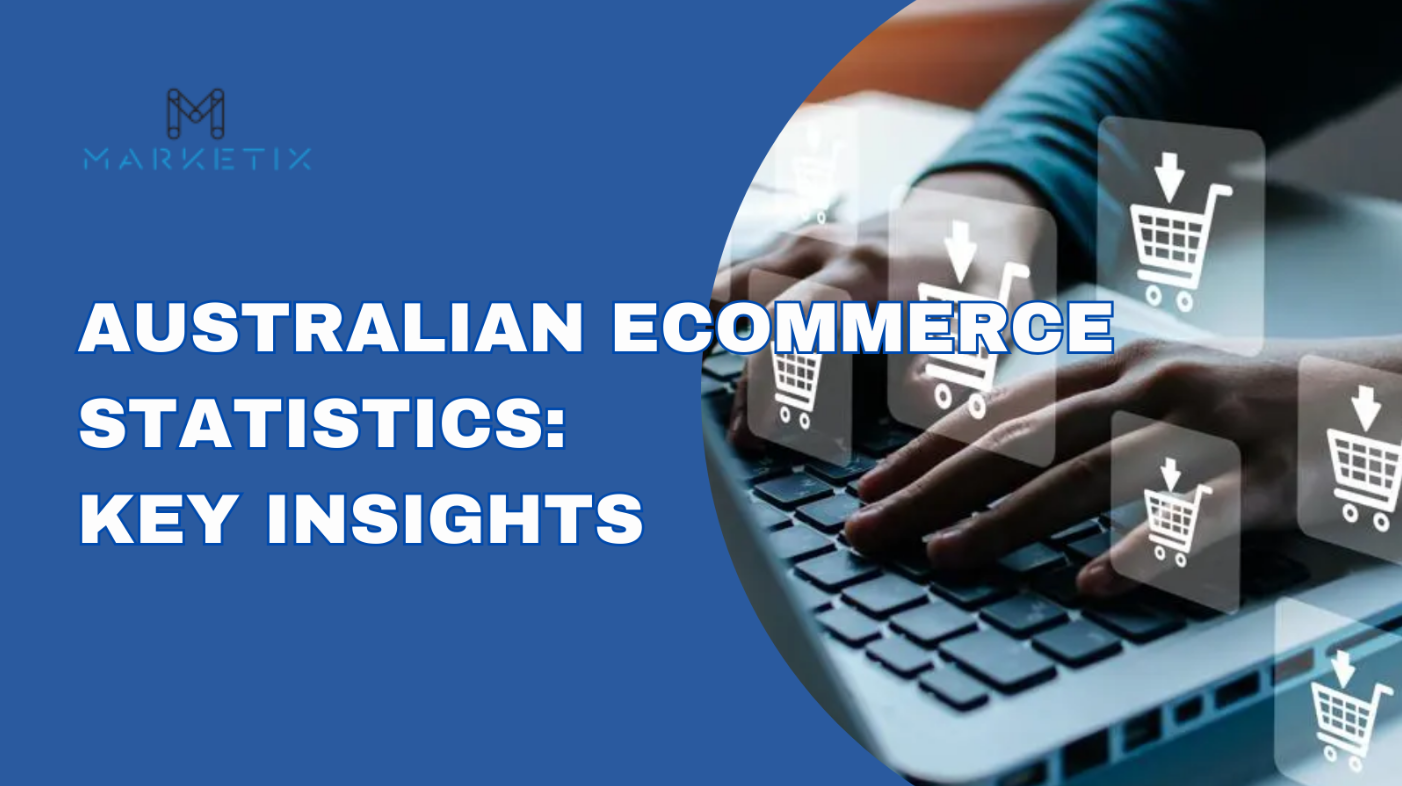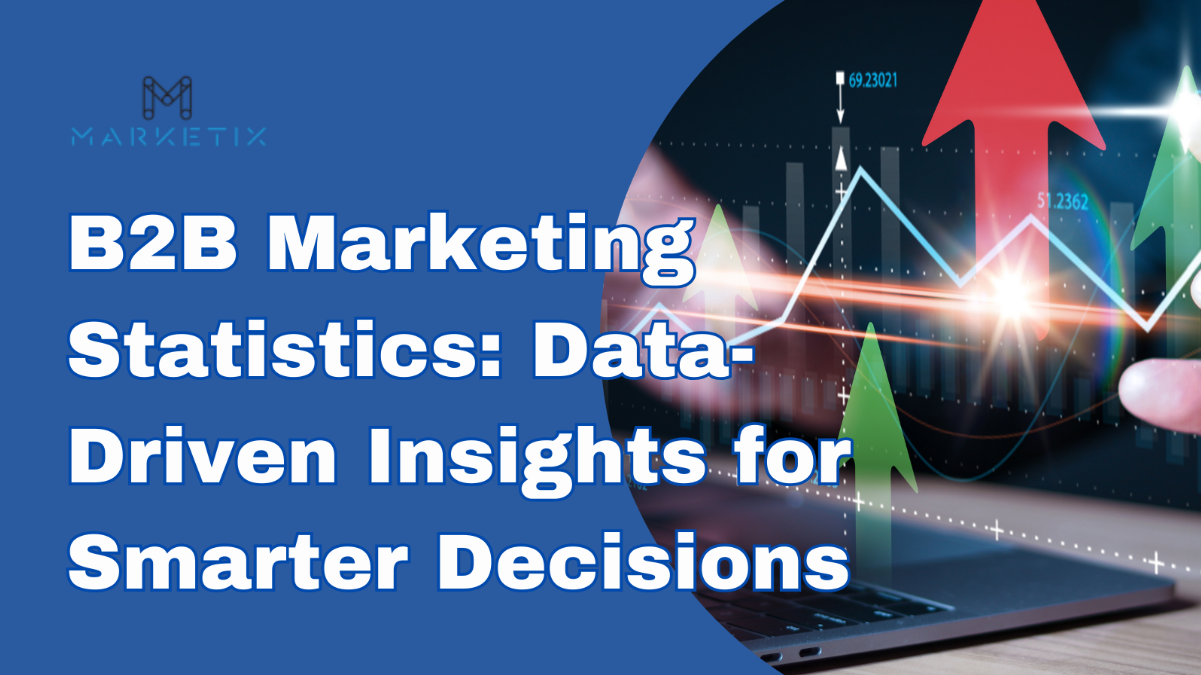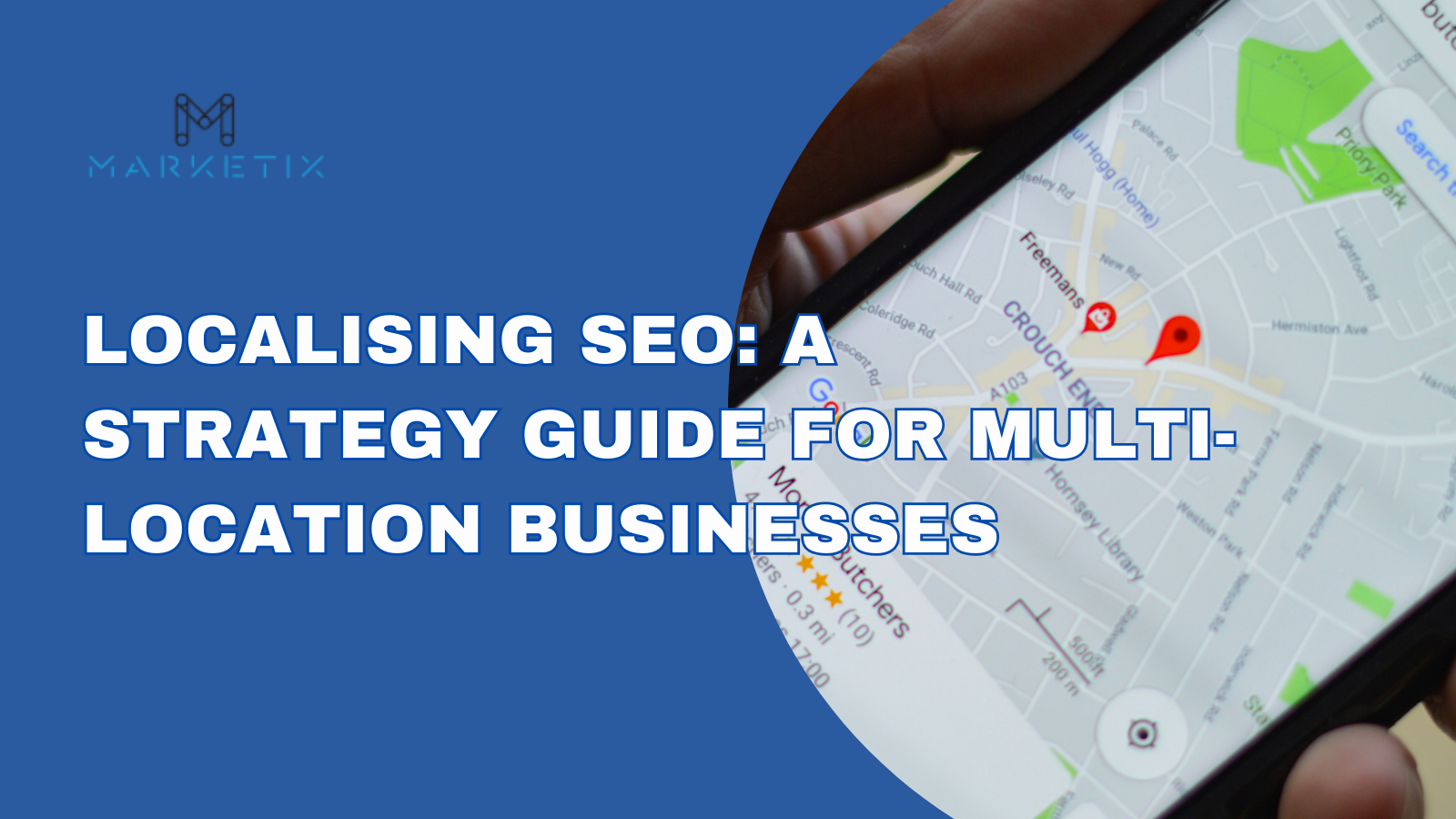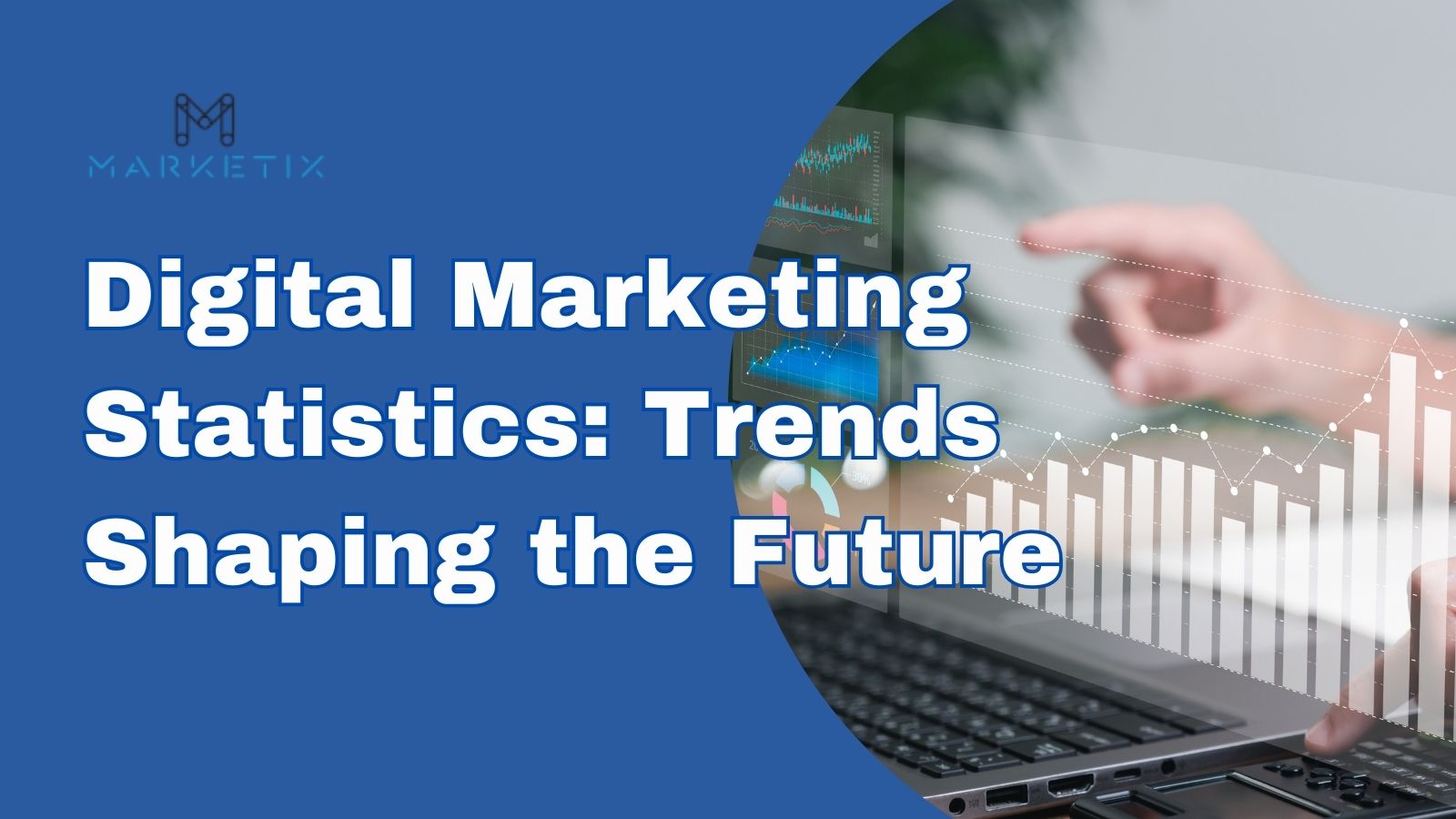Content Marketing Statistics: Key Data Points You Need to Know for 2024
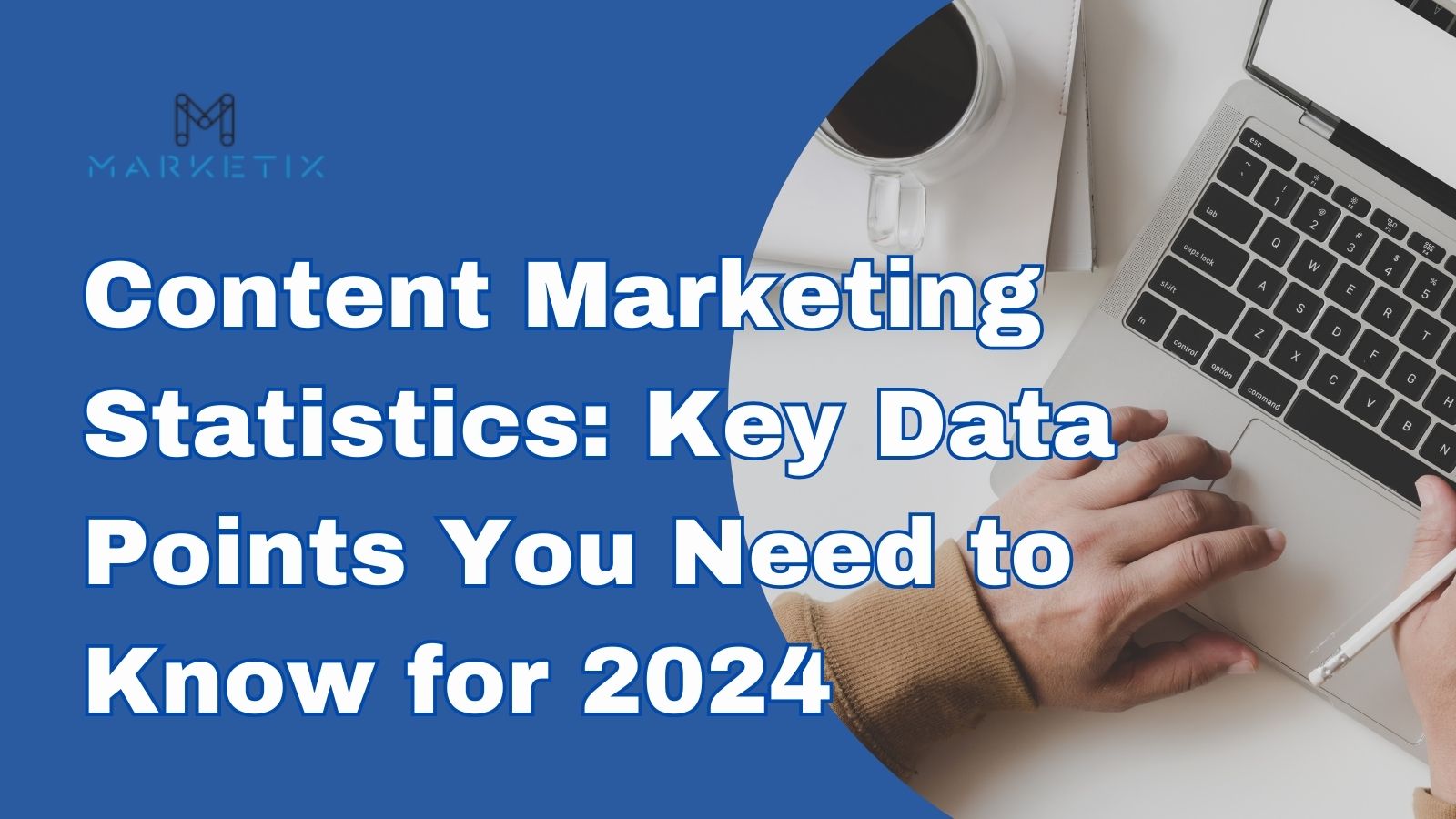
Content has become the backbone of how brands connect with their audience. Whether it’s a blog that offers valuable insights, a video that grabs attention, or a social media post that sparks a conversation, content is how we engage and build trust.
This year, certain trends are making a big impact. Video content is skyrocketing, personalisation is becoming non-negotiable, and even smaller brands are finding their voice in unique ways. To help you stay on top, we’ve gathered the most important stats that will shape content marketing in 2024.
Content Marketing Statistic #1: 91% of B2B and 86% of B2C Marketers Are Actively Utilising Content Marketing
Content marketing has become nearly prevalent among businesses, with an overwhelming majority recognising its importance. In 2024, 91% of B2B marketers and 86% of B2C marketers are actively using content marketing as part of their broader digital strategies.
This widespread adoption is driven by the ability of content marketing to provide value to audiences at every stage of the buyer's journey. For B2B companies, content marketing is particularly effective in nurturing leads and establishing thought leadership, while B2C companies leverage content to build brand loyalty and encourage repeat purchases.
The consistently high adoption rate across both sectors underscores content marketing’s versatility and effectiveness in driving business results.
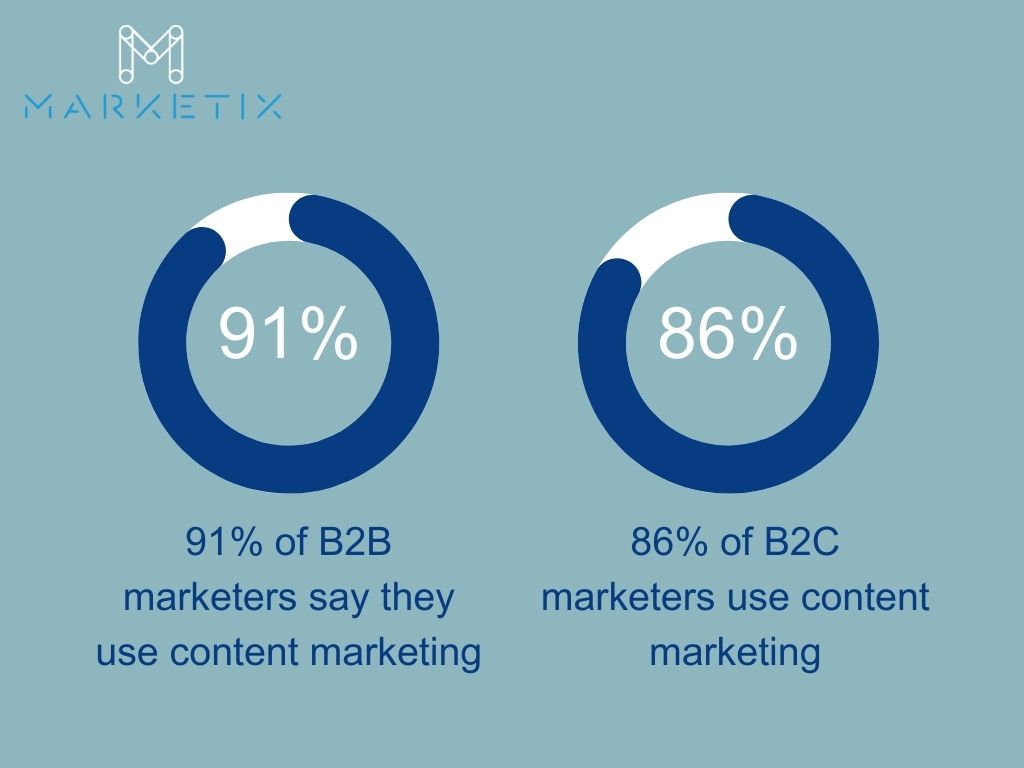
Content Marketing Statistic #2: Businesses Spent Approximately $80 Billion on Content Marketing
As the value of content marketing becomes increasingly clear, businesses are allocating more of their budgets toward it. In 2023, businesses in the United States alone spent approximately $80 billion on content marketing, and this figure is expected to grow by 12% in 2024, reaching around $89.6 billion.
This significant investment reflects the understanding that content marketing is not just a tactic but a long-term strategy that requires consistent funding and resources. Companies are investing in various types of content — blogs, videos, infographics, podcasts, and more — recognising that high-quality, well-distributed content is essential for capturing audience attention.
Moreover, this growing investment indicates that businesses are increasingly focusing on creating more personalised and engaging content to better connect with their target audiences.
Content Marketing Statistic #3: 75% of Marketers Focus on Tracking and Measuring ROI via Engagement Metrics
The return on investment (ROI) for content marketing is a critical metric for businesses, as it directly impacts budgeting and strategy decisions. In 2024, 75% of marketers concentrate on tracking and measuring ROI through various engagement metrics such as time spent on content, social shares, comments, and conversions.
Companies that invest heavily in content marketing are seeing substantial returns, with data showing that they are 13 times more likely to achieve a positive ROI compared to those that do not prioritise content. This impressive statistic highlights the importance of strategic content planning, targeted distribution, and continuous performance evaluation.
Businesses that can effectively track and optimise their content marketing efforts are better positioned to generate higher returns, making content marketing a smart investment for sustainable growth.
Content Marketing Statistic #4: Video-Driven Content Strategies Lead to 49% Faster Revenue Growth
Video content has emerged as the most engaging and widely consumed type of content on the internet. By the end of 2024, it’s estimated that video will account for 82% of all consumer internet traffic, driven largely by the popularity of platforms like YouTube, TikTok, and Instagram, as well as the increasing prevalence of video on social media and corporate websites.
The impact of video on business growth is undeniable. Companies that incorporate video into their content marketing strategies are experiencing 49% faster revenue growth compared to those that do not. This is because video content is not only highly engaging but also versatile — businesses use it for everything from product demos and testimonials to brand storytelling and educational content.
Furthermore, 87% of video marketers report that video provides a positive ROI, a dramatic increase from just 33% in 2015. This shift underscores the growing recognition of video as an essential element of a comprehensive content marketing strategy.
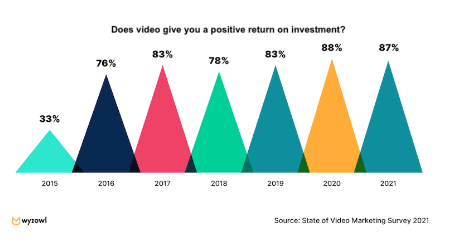
Content Marketing Statistic #5: Prioritising Blogging Increases the Likelihood of Positive ROI by 13 Times
Blogging continues to be a foundation of content marketing strategies, offering numerous benefits for businesses that publish high-quality, relevant content regularly. In 2024, companies that maintain an active blog are seeing 55% more website visitors compared to those that do not blog.
The reason behind this significant increase in traffic is multifaceted. Blogs provide a platform for businesses to address customer pain points, share industry insights, and position themselves as thought leaders. Additionally, blogging plays a pivotal role in search engine optimisation (SEO). By regularly publishing keyword-optimised content, businesses can improve their search engine rankings, leading to increased organic traffic.
In fact, 72% of marketers cite content creation as their most effective SEO tactic, and companies that prioritise blogging are 13 times more likely to see a positive ROI on their overall marketing efforts.
Content Marketing Statistic #6: 95% of Content Marketers Plan to Rely on Social Media, with LinkedIn, Facebook, and Instagram Leading the Way
Social media platforms are integral to content distribution, offering businesses an effective way to reach and engage with their audiences. In 2024, 95% of content marketers plan to use social media to promote their content, with LinkedIn (94%), Facebook (89%), and Instagram (83%) being the most popular platforms.
The effectiveness of social media in content marketing is reflected in its ability to drive engagement and amplify reach. Social media platforms provide opportunities for content to go viral, increase brand visibility, and foster direct interaction with audiences.
The average engagement rate on social media is 3.5%, which highlights its potential to build and nurture relationships with consumers. Moreover, social media platforms offer advanced targeting and analytics tools, enabling marketers to refine their strategies and optimise their content for better performance.
Content Marketing Statistic #7: 80% of Consumers Expect Personalised Content Tailored to Their Preferences and Needs
As of today, personalisation has become an expectation rather than a luxury. In 2024, 80% of consumers expect businesses to deliver personalised content experiences tailored to their preferences, behaviour, and needs.
Marketers who effectively implement personalisation into their content strategies are seeing substantial benefits, including a 20% increase in sales. Personalised content — whether it's emails, product recommendations, or dynamic website content — creates a more relevant and engaging experience for the user, which leads to higher satisfaction and conversion rates.
Personalised emails, for example, have a 26% higher open rate than non-personalised ones, and businesses that segment their email campaigns see a 760% increase in revenue. These statistics underscore the power of personalisation in driving both customer loyalty and business growth.

Content Marketing Statistic #8: 61% of Marketers Prioritise SEO and Organic Growth as Their Top Inbound Marketing Focus
SEO remains a fundamental component of content marketing, as it directly influences a brand’s online visibility. In 2024, 61% of marketers indicate that improving SEO and growing their organic presence is their top inbound marketing priority.
High-quality, SEO-optimised content is essential for driving organic traffic to websites. SEO helps content rank higher in search engine results, making it easier for potential customers to discover your business.
The importance of SEO is further emphasised by the fact that 70% of marketers find SEO more effective than Pay-Per-Click (PPC) advertising for driving sales. This effectiveness is due to the long-term benefits of organic search traffic, which, unlike paid ads, doesn’t stop delivering results once a campaign ends.
Content Marketing Statistic #9: 60% of Marketers Cite Creating Engaging Content as Their Biggest Challenge
While content marketing offers numerous benefits, it presents several challenges marketers must surpass. In 2024, 60% of marketers identify creating engaging content as their biggest challenge. This is followed by the difficulties of producing content consistently (52%) and measuring content effectiveness (44%).
These challenges highlight the need for a well-structured content strategy. Creating engaging content requires a deep understanding of the target audience, clear communication of value propositions, and the ability to tell compelling stories. Consistency in content production is equally important, as it helps maintain audience interest and improve SEO performance.
Finally, measuring content effectiveness involves tracking key performance indicators (KPIs) such as engagement, traffic, and conversions, and using this data to refine strategies over time.
Content Marketing Statistic #10: 50% of Marketers Are Turning to AI Tools for Streamlining Content Creation, Distribution, and Analysis
Artificial Intelligence (AI) is rapidly transforming content marketing by providing tools that enhance efficiency and effectiveness. In 2024, 50% of marketers expect to use AI-driven tools to streamline content creation, distribution, and analysis.
AI is being used to automate tasks such as content generation, where tools can produce articles, social media posts, and even videos with minimal human intervention. AI also plays a critical role in analysing audience data, enabling marketers to create more personalised content and predict future trends.
Moreover, AI-powered tools are helping businesses optimise content distribution by identifying the best times and platforms for posting. Marketers who embrace AI are seeing a 30% increase in productivity and a 25% reduction in costs, making it an indispensable asset in the modern content marketer’s toolkit.
Content Marketing Statistic #11: Email Marketing is the Most Effective Tool for 41% of Marketers
Email marketing remains one of the most reliable channels for driving engagement and conversions. 41% of marketers identified email as their most effective marketing tool. This statistic underscores the enduring power of email marketing in maintaining customer relationships, nurturing leads, and driving sales.
With advancements in email automation and personalisation, marketers can now deliver highly targeted and relevant content directly to their audience's inbox, ensuring higher open rates, click-through rates, and conversions.
Content Marketing Statistic #12: Micro-Influencer Partnerships Yield Success for 47% of Marketers
As influencer marketing continues to evolve, businesses are increasingly finding success with smaller, niche content creators. In 2024, 47% of marketers report successful partnerships with micro-influencers, who typically have between 1,000 to 100,000 followers.
These partnerships are proving to be highly effective because micro-influencers often have more engaged and loyal followings compared to larger influencers. Their content is perceived as more authentic, which resonates well with audiences, leading to higher engagement and conversion rates for the brands they promote.
Content Marketing Statistic #13: 89% of Customers Want More Video Content from Brands
Video content remains in high demand, with 89% of customers expressing a desire to see more videos from brands in 2024. This preference for video is driven by its ability to deliver information quickly and engagingly. Consumers are increasingly turning to video for product information, tutorials, and entertainment.
Brands that prioritise video content are better positioned to capture their audience's attention and deliver messages effectively. This statistic highlights the need for businesses to ramp up their video production efforts, ensuring they meet the growing demand and stay competitive in the market.
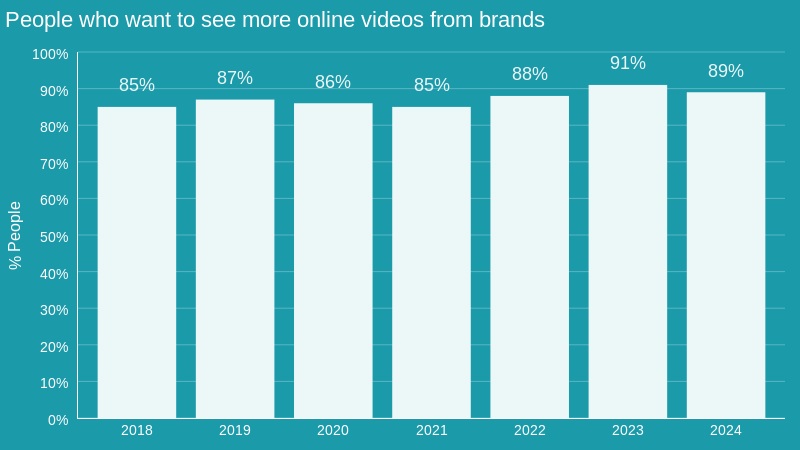
Content Marketing Statistic #14: 66% of AI-Adopting Businesses Focus on Traffic as a Key Metric
For businesses leveraging AI in their content marketing strategies, traffic remains a critical performance metric. In 2024, 66% of businesses using AI tools report that increasing website traffic is one of their primary goals.
AI helps in this regard by optimising content for search engines, predicting user behaviour, and personalising content to drive more relevant traffic to websites. By focusing on traffic as a key metric, these businesses can better assess the effectiveness of their content strategies and make data-driven decisions to enhance their online presence.
Content Marketing Statistic #15: AI Automation and Chatbots Enhance Marketing Effectiveness for 25% of Marketers
AI automation and chatbots are increasingly becoming integral to marketing strategies, with 25% of marketers reporting that these tools make their efforts more effective. AI-driven automation helps marketers streamline repetitive tasks, such as content distribution, email marketing, and social media posting, freeing up time for more strategic activities.
Chatbots, on the other hand, provide real-time customer support and engagement, helping businesses interact with their audience more efficiently and personally. These technologies enhance the customer experience and improve overall marketing efficiency, leading to better results and higher ROI.
Content Marketing Statistic #16: Nearly 80% of Small Businesses Create Their Own Content
Content creation is a task that many small businesses handle in-house. In 2024, nearly 80% of small business owners and marketers report writing content themselves, while only 17% hire in-house writers and 14% work with freelancers. This hands-on approach allows small businesses to maintain a strong brand voice and directly reflect their values and messaging in their content.
However, it also presents challenges, such as time management and content quality, especially as these businesses scale. The statistic underscores the importance of investing in content creation resources, whether through training, tools, or outsourcing, to ensure content remains impactful and effective.
Content Marketing Statistic #17: 69% of Marketers Invest in Video Ads
Video advertising continues to be a integral part of marketing campaigns, with 69% of marketers investing in video ads in 2024. This investment reflects the growing importance of video content in capturing audience attention and driving conversions.
Video ads are particularly effective in conveying messages quickly and memorably, making them ideal for platforms like YouTube, Facebook, and Instagram. The high engagement rates and potential for virality make video ads a powerful tool in a marketer's arsenal, helping brands stand out in a crowded digital marketplace.
Content Marketing Statistic #18: Blogging Remains Essential, with 79% of Content Marketers Maintaining Active Blogs
Blogging is far from obsolete — in fact, it’s a critical component of content marketing strategies for 79% of content marketers in 2024. Active blogs serve as a hub for a brand’s content, providing a platform for sharing insights, industry news, and educational resources.
Blogs also play a role in SEO, helping businesses attract organic traffic and establish authority in their niche. By maintaining an active blog, content marketers can engage their audience, drive traffic, and support broader marketing goals, such as lead generation and customer retention.
Content Marketing Statistic #19: 48% of Content Marketers Prioritise Learning New Technologies
As the digital industry keeps progressing, content marketers are increasingly focusing on upskilling. In 2024, 48% of content marketers identified learning to work with new technologies as their top upskilling goal. This focus on technology is driven by the need to stay competitive in a rapidly changing environment.
From AI and automation tools to data analytics and content management systems, mastering new technologies enables marketers to create more efficient, effective, and innovative content strategies. This commitment to continuous learning ensures that marketers can leverage the latest tools to optimise their campaigns and achieve better results.
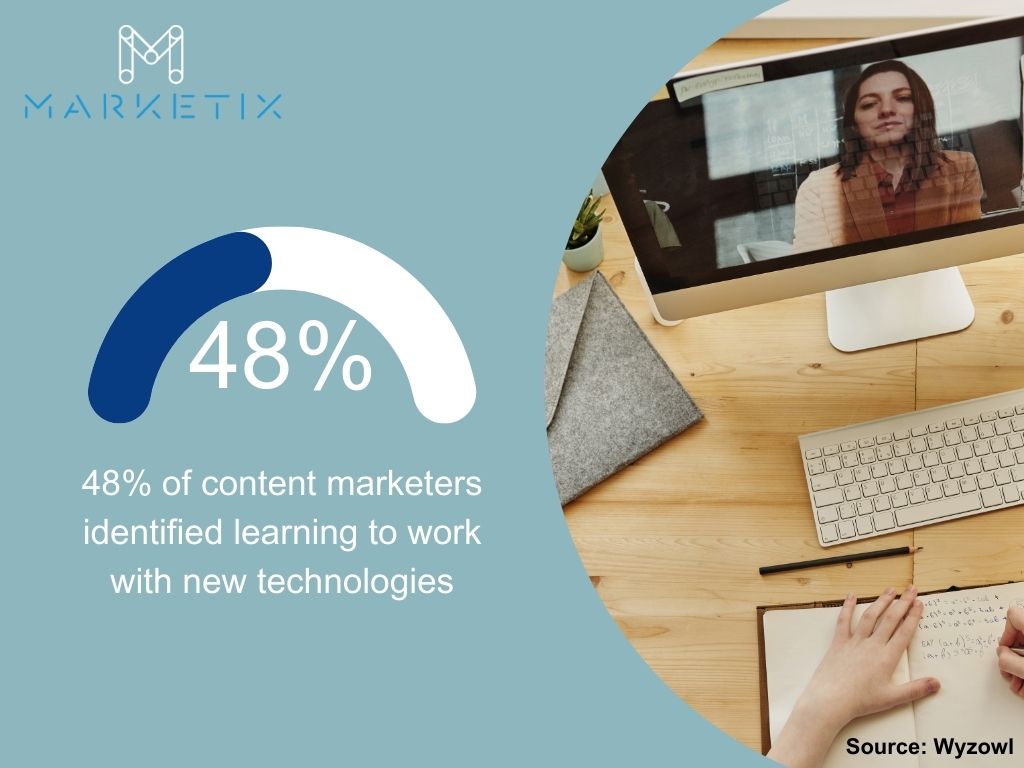
Content Marketing Statistic #20: 64% of B2B Businesses Include Link-Building in Their Content Strategies
Link-building remains a key tactic for B2B marketers, with 64% including it in their content marketing strategies in 2024. High-quality backlinks are essential for improving a website’s search engine rankings, driving organic traffic, and establishing authority in a specific industry.
Effective link-building involves creating valuable content that others want to reference and share, as well as actively seeking out opportunities for collaboration, such as guest blogging or partnerships. For B2B businesses, a strong link-building strategy can significantly enhance their online visibility and credibility, leading to more qualified leads and sales opportunities.
Content Marketing Statistic #21: 80% of Businesses See Results from Blogging
Blogging is not just popular — it’s effective. In 2024, 80% of businesses report generating measurable marketing results through their blogging efforts. Whether it’s increased website traffic, higher engagement, or improved lead generation, blogging remains a cornerstone of successful content marketing strategies.
This statistic underscores the importance of maintaining a consistent blogging schedule and producing high-quality, relevant content that resonates with your target audience. By doing so, businesses can build trust, establish thought leadership, and drive long-term success.
Content Marketing Statistic #22: Educational Content Dominates, with 76% of Bloggers Publishing Informative Posts
Educational content continues to be a primary focus for bloggers, with 76% publishing informative posts that provide value to their audience. Educational content, such as how-to guides, tutorials, and expert advice, not only attracts readers but also helps build a brand’s authority in its industry.
Additionally, list posts remain a popular format among bloggers, offering a concise and organised way to present information. By focusing on educational content, bloggers can engage their audience more effectively, boost SEO performance, and support their broader content marketing goals.
Ready to Take Your Content Marketing Strategy to the Next Level?
The content marketing landscape in 2024 is characterised by increasing investment, the rising importance of video, the critical role of personalisation, and the growing influence of AI.
By understanding and leveraging these key statistics and trends, businesses can create content strategies that resonate with their target audiences and deliver measurable results. If you need any assistance, contact Marketix Digital today!
Recent Posts
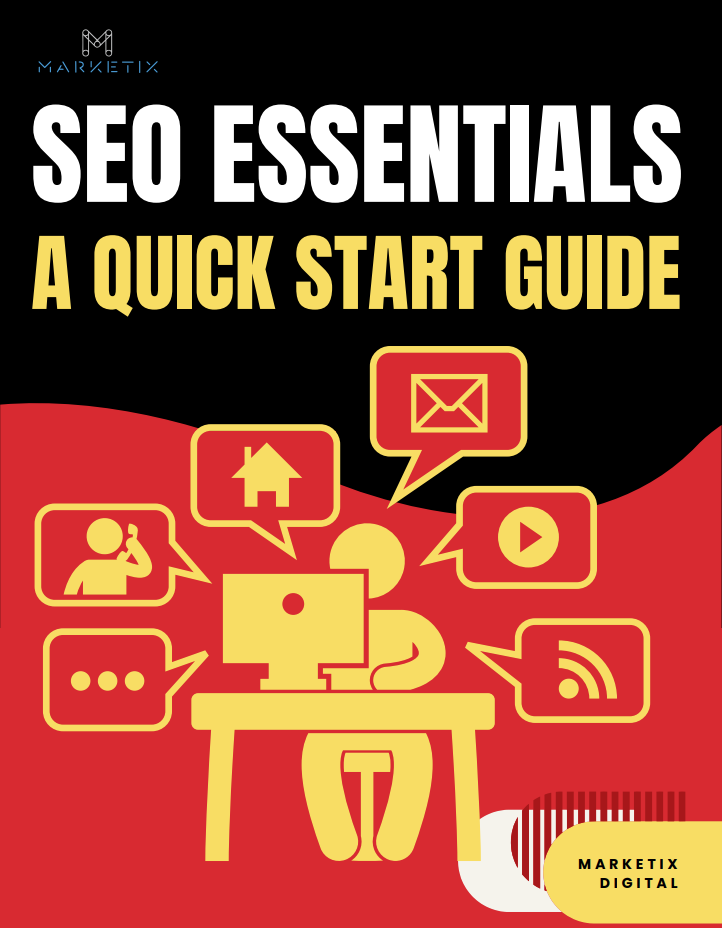
Free Download SEO Book
Download our 24-page SEO book to learn:
- How SEO Really Works
- How to Rank #1
- Content & SEO
- Choosing an SEO Agency
Thank you!
You have successfully joined our subscriber list.
Recent Posts

